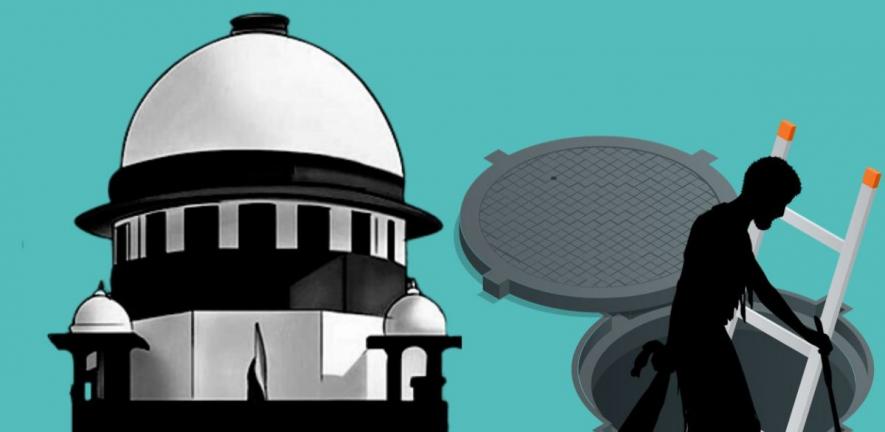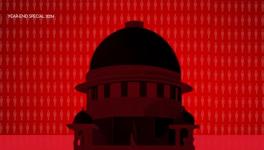Supreme Court Passes Directions on Eradication of Manual Scavenging

Representational Image.
A division Bench comprising Justices S. Ravindra Bhat and Aravind Kumar increases compensation for deaths and disability due to manual scavenging and working in sewers and passes measures for rehabilitation of the victims and their families.
—
On Friday, the Supreme Court passed directions to Union and state governments in respect of the complete eradication of manual scavenging in India.
A division Bench comprising Justices S. Ravindra Bhat and Aravind Kumar was hearing a public interest litigation (PIL) filed by Dr Balram Singh in person.
The PIL urged the Bench to issue directions for the implementation of the Employment of Manual Scavengers and Construction of Dry Latrines (Prohibition) Act, 1993 and Prohibition of Employment as Manual Scavengers and their Rehabilitation Act, 2013.
As per Section 2(1)(g) of the Act, manual scavenging is defined as manually cleaning, carrying, disposing of, or handling in any manner, human excreta in an ‘insanitary’ latrine.
In Safai Karamchari Andolan and Others versus Union of India and Others (2014), the Supreme Court had issued guidelines for preventing future generations from being engaged in the practice of manual scavenging; and rehabilitation of manual scavengers, including through cash assistance, training for self-employment and education.
On July 13, the amicus curiae advocate K. Parmeshwar, had pointed out that according to the National Commission for Safai Karamcharis (NCSK)’s annual report for 2019–20, a survey conducted in 18 states found that 42,303 people continue to work as manual scavengers as on August 20, 2019.
The NCSK is a non-statutory body that monitors the implementation of the 2013 Act, enquires into complaints, advises the Union and state governments on the effective implementation of the Act and takes notice of non-implementation.
Today, noting that the Bench has issued 14 directions, Justice Bhat highlighted the direction for the increase in the scale of compensation to ₹30 lakh in case of sewer deaths.
The Bench also directed an increase in compensation in case of permanent disablement or injury to not less than ₹20 lakh and in case of any disability, to not less than ₹10 lakh.
In Safai Karamchari Andolan, the Supreme Court had directed the government to award compensation of ₹10 lakh to the family of every person who had died in sewage work since 1993.
The Wire has reported that only 50 percent of workers who died cleaning sewers between 1993 and 2013 received the compensation.
Further, the Bench directed that certain active measures be taken for the rehabilitation of the victims of manual scavenging as well as their families, making provisions of scholarship and ensuring their skill development.
To ensure constant monitoring of the progress made in the implementation of the directions, the Bench has directed coordination among all the involved agencies. High courts are not precluded from continuing to monitor the implementation of the directions and laws, Justice Bhat noted.
While concluding the judgment, Justice Bhat quoted Dr Babasaheb Ambedkar, “For ours is a battle not for wealth or for power. It is a battle for freedom. It is the battle of reclamation of human personality.”
The judgment notes that the Constitution makers have given a commitment to all sections of society to be treated equally by entrenching emancipatory provisions such as Articles 15(2), 17, 23 and 24 of the Constitution.
In view of the obligations under the Constitution and 2013 Act, “The State is duty-bound to ensure that the practice of manual scavenging is completely eradicated,” the judgment observes.
While reading excerpts from the judgment, Justice Bhat referred to the large segment of India’s population that continues to be involved in this practice as “unseen, unheard and muted in bondage, systematically trapped in inhuman conditions”.
The judgment calls upon individuals to “awake and arise so that the darkness which has been the fate of generations of our people [involved in the practice of manual scavenging] is dispelled”.
The Supreme Court will examine the progress made in the implementation of the directions on February 1, 2024.
Sarah Thanawala is a staff writer at The Leaflet
Get the latest reports & analysis with people's perspective on Protests, movements & deep analytical videos, discussions of the current affairs in your Telegram app. Subscribe to NewsClick's Telegram channel & get Real-Time updates on stories, as they get published on our website.
























